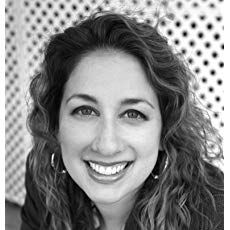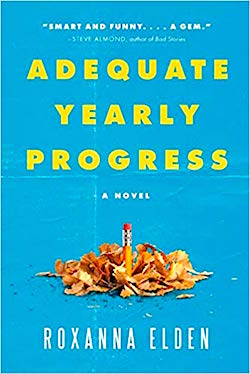The Back to School Faculty Meeting (a Novel Excerpt)
Novels about school are rare and those that do exist often feature a lone heroic teacher defying the odds in a school where nobody else seems to care.

The first chapter follows third-year language arts teacher Lena Wright, who walks into school at the end of the summer and greets her colleagues, then learns some interesting news. Here, Roxanna shares Chapter 2 with us — the back-to-school faculty meeting. Despite the high school trappings, we’re pretty sure veteran middle school educators can recall similar experiences.
Chapter 2: Science
Hernan D. Hernandez slipped in at the back of the auditorium. The back-to-school faculty meeting hadn’t officially started yet, but it felt too late to walk to the front of the room to join the rest of the science department. He slid into a nearby seat, its springs sighing at the year’s first interruption.
A presenter from the district stood on the stage, grinning at no one in particular. She was one of those heavily accessorized, well-connected former teachers who had long ago retreated to offices within the district headquarters, emerging at the beginning of each school year to give PowerPoint presentations.
Behind her, a screen glowed with a picture of a beach at sunrise, hundreds of sea stars dotting the sand. All of which suggested they were going to start with the starfish story.
Hernan pulled a pen from his computer bag. The bag had spent the summer in his closet, and its reemergence was one of many reminders that summer was over—no more soccer games with his nephew, no more helping his father in the backyard or experimenting in the greenhouses of the Hernandez Plant Nursery. For the next ten months, he’d spend most of his time indoors.
“Good morning, y’all!” said the presenter.
Conversation sounds dwindled as a few teachers returned the greeting.
“I know everyone is sleepy, but we can do better than that! I said good morning!”
“Gmrning.” It came out as a grumble. This crowd spent too much time around teenagers to respond to demands for cheerfulness. Plus, everyone now sensed that the presentation would start with the starfish story, which rarely preceded good news.
The door behind Hernan opened to let in a few more stragglers. He turned in time to see Lena Wright appear in its frame, the light of the hallway behind her. Her silhouette was slim and graceful, topped by an unruly crown of curls extending in all directions. She paused as if assessing whether it was too late to sit with the English department.
Then she turned her attention to the back rows, brightening when she spotted Hernan. His faculty-meeting experience improved considerably as she slid into the seat next to him.
“Did I miss anything?” she whispered.
“Not much.” Hernan gestured toward the screen.
“I’d like to start with a little inspiration this morning!” said the presenter.
Lena squinted at the beach scene, massaging her temples with one hand as if she had a headache. She had short nails and thin fingers, her bone structure as delicate as the wing of a bat. “Uh-oh. Is she going to tell us the starfish story?”
“Once, a man was walking along a beach,” the presenter began. “On the beach lay hundreds of starfish.”
“Looks like it.” Immediately, Hernan lamented the answer’s lack of cleverness. Growing up with two sisters should have given him an edge in talking to women….
And yet, around the women who interested him most, he seemed always to miss some crucial opening, some moment of possibility that floated past without his reaching out to grab it. His dealings with Lena were no exception. Even at this moment, her presence alternated between lifting his spirits and intimidating the hell out of him.
“The starfish had been stranded by the tide!” The presenter’s eyes widened as she read the creatures’ dramatic fate from the next slide.
“Soon, the sun would rise and bake them to death!”
“She seems pretty surprised by this story line,” whispered Lena.
“Maybe she’s never heard it before.”
Lena let out a whoosh of breath that might have been a laugh.
“In the distance, the man could see a young boy going back and forth between the surf’s edge and the sand.” The presenter’s habit of speaking slowly and emphasizing words suggested her past teaching experience had been in elementary school. “He was picking up the starfish, one by one, and throwing them back into the sea.”
Click. A dancing cartoon starfish appeared on the screen. The pointy-headed figure shimmied on the starfish appendages that served as legs and waved the starfish appendages that served as arms.
“Nice touch with the graphics,” said Lena. “Really adds to the story.”
“Well, they definitely got the science part right. That’s exactly how a starfish would dance if it could stand on its side.”
Lena laughed aloud. The treads of Hernan’s confidence regained their grip.
Click. Smile. “The man couldn’t believe this young boy thought he could make a difference by throwing just one starfish at a time back into the water. There were far too many starfish stranded on that beach to save them all!”
Hernan tried to think of something noteworthy enough to spark conversation. Lena wasn’t really his friend so much as a colleague who often ended up at the same happy hour. He’d first noticed her when she’d started working at the school two years earlier, strutting the hallway with braids held back by a colorful cloth headband. His real interest in her, however, had started the morning she showed up completely bald.
There had been competing explanations from Mrs. Friedman-Katz, who believed Lena was a cancer patient (“poor thing”), and from Mrs. Reynolds-Washington, who believed she was a lesbian (“I always knew that girl was a little strange”). Hernan had hoped neither rumor was true and had been relieved as Lena’s hair grew into a halo of wild curls.
Click. “The man approached the little boy who was picking up the starfish. ‘You must be crazy,’ said the man. ‘There are so many miles of beach covered with starfish. You can’t possibly make a difference by saving just one starfish at a time!’”
Hernan surveyed the landscape of seated teachers. The science and math departments were in their usual seats up front, within the sight lines of the presenter. The coaches lined the back of the room, where they could slip out to check the action on the field. Any teachers who could get away with it were working discreetly on other things. Occasionally they looked up with exaggerated intensity, as if absorbed by the suspense of the starfish story.
“Let’s have one of you read the next line from your packet!” The presenter’s mouth was still smiling, but her eyes had noted the audience’s drifting attention.
From the back of the room, a voice called, “What packet? I never got a packet.”
Another voice chimed in. “I don’t have a packet, either!”
“Oh . . . well . . . they should be circulating from the front to the back. Has anyone seen the packets?” A few teachers near the front raised their hands. Among them was Maybelline Galang, who strained toward administrative praise like a flower toward the sun. She was taking notes as if she’d never heard the starfish story in her life.
“I got the last one,” said a voice a few rows behind Maybelline.
“Okay.” The presenter’s voice was losing its zest. “It looks like we don’t have quite enough copies, so if you don’t have a packet, please share with someone next to you, and maybe some of y’all in the back can move up to share with someone in the front?”
A few latecomers took the opportunity to hurry up the aisles and sit with their departments. Hernan was glad to see Lena wasn’t one of them.
“My packet is missing pages one and two,” said another voice.
“Oh . . . right,” said the presenter. “I meant to tell y’all—the page numbers are a little off. So, the packet starts on page three, and it’s stapled on the right instead of the left, but if you just flip over page three, you’ll see page two . . . You see it? Page one is behind that.
Okay, great! We’re on page four.”
Click. The reddish glow of another ocean sunrise cascaded over the teachers, some of whom were now fumbling with the misstapled packets. Others bent over their laps, still trying to complete paperwork by the low light of the new slide.
“So, just to review: The man didn’t think the boy could ever make a difference, right? Since there were so many starfish washed up on the beach? And the boy can only save one at a time, right? Right, everyone?” She waited until a few teachers nodded before advancing the slide.
“The little boy picked up one more starfish and threw it back into the ocean. Then he turned to the man and said, ‘It sure made a difference to that one!’”
She paused, gazing at the teachers in front of her as if watching butter sink into a warm muffin. Then she continued. “I think that story really speaks to the difference a great teacher can make, which leads me to what I’m so excited to discuss with you all today! I’ll give you a hint.”
Click. The beach scene disappeared, replaced by a bright blue sky. Across the sky, written in cloud letters, stretched a single word: believe. “I want you all to help me finish this sentence: If you believe, your students will . . .”
The teachers sat silently, bracing for the unpleasant news that always dropped at the end of the starfish story.
“It rhymes with believe.”
“Deceive?” called a voice from the back of the room.
Hernan knew Mr. Weber, the school’s union representative, was just stalling. “Believers make achievers” was the most often quoted line from Nick Wallabee’s book, the cover of which featured a photo of Nick Wallabee standing in a sparse classroom, foot planted on an empty student desk, gazing defiantly into the camera on behalf of children.
The news that he was now their superintendent had elevated Mr. Weber’s predictable drizzle of sarcasm and conspiracy theories to a raging thunderstorm.
“You’re close!” said the presenter. “But maybe something a little more positive?”
“New Year’s Eve?” offered another voice.
“Good guess . . . getting closer!”
“Sleeve!”
“Um . . .” She was running out of ways to gently correct wrong answers.
“Achieve.“ It was Maybelline Galang.
“She would be the one to mess that up,” whispered Lena.
“Very good!” said the presenter. “And that’s what we want all our students to do: achieve! Accomplish great things!” It seemed she’d added this last part for those who might not know what the word achieve meant and thus might not catch the cleverness of the rhyme.
“And we know they can do that as long as their teachers believe in them. There’s real research and statistics about this. That’s why when I was a teacher I used to tell my students: Reach for the moon! Even if you miss, you’ll land among the stars!”
Hernan noted some scientific discrepancies in the moon-and-stars metaphor. For one thing, the moon was much closer to Earth than the stars were. Also, stars were huge, burning balls of gas millions of light-years away from one another, so you could in no way “land among” them, nor would you want to. These were just the most glaring errors he could have pointed out, possibly drawing another laugh from Lena.
But then he worried the whole thing might sound too science geek–ish, like his earlier urge to point out that “starfish” were not actually fish. The correct term for them was sea stars. In the end, the comment-making window closed before he said anything at all. He sat, trapped in silence, gazing into the blue PowerPoint sky.
The presenter’s jargon cut mercifully into his awkwardness. “So this year, with the help of our new superintendent, our district is going to help teachers really take ownership of student achievement!” She stared into the corner farthest from Mr. Weber, who was waving his hand to get her attention. “It’s going to be such an exciting year!”
Mr. Weber dropped his hand and bellowed, too loud to be ignored, “This is another way of saying our jobs will depend on students’ TCUP scores, right?”
“Actually, test scores are just one part of the evaluation formula, which we are developing right now with our new superintendent.” Her speed increased, as if she’d just remembered this part of the presentation was to be delivered quickly, using big words and long sentences. “It’s going to be a really collaborative effort to get our students where they need to be. So exciting!”
“Now, wait,” Mr. Weber interjected. “Just so I’m clear: This means our jobs will depend on test scores and some formula that hasn’t even been developed yet?”
“I’m so glad y’all are asking so many great questions, and I’m actually really excited to announce that this year’s evaluation will include a category called the Believer Score. That’s going to let you all gain points by proving you believe all students can learn. It’s going to be a total paradigm shift!”
The auditorium buzzed. This, it seemed, was the bad news presaged by the starfish story.
“And how will they be calculating this ‘Believer Score,’ exactly?” Mr. Weber was standing now.
“I’m so glad you’re asking!” The presenter’s smile hung on like a bull rider at a rodeo. “For now, just be ready to show that you fully embrace any new initiatives.”
The collective grumbling intensified.
“In other words,” translated Lena, just barely lowering her voice now, “we have to act excited about anything they tell us to do?”
The presenter strained to maintain her cheerful tone as she increased her volume. “I know change is hard, everyone, but remember: We’ve been changing since we were born! And let’s not forget that this is really about the students!”
Hernan willed himself to think of something clever to say about the Believer Score, but nothing came to mind. His awkwardness returned and coagulated around him as the noise in the room grew.
It was Lena who finally spoke again. “Have you heard anything about this Believer Score stuff?”
“A little,” said Hernan. “But I wouldn’t worry about it. Doctor Barrios is good at keeping the heat off the school.”
“You sure? Weber doesn’t seem to be the only one worried this time around.”
She was looking to him for reassurance, he realized. And why not? This was only Lena’s third year at a school where he’d worked for seven.
His awkwardness lifted. He didn’t need some clever line—he had experience. “Yeah, Doctor Barrios is like the superintendent whisperer.”
Lena laughed. Again.
“In fact, that’s probably why he’s not here right now. He’s probably becoming Nick Wallabee’s new best friend as we speak.”
Even as Hernan said it, he realized he had no idea if this was actually the case. But it was possible. For as long as he could remember, the principal had never missed a back-to-school meeting.
On a related note, the teachers in the auditorium had never been so noisy.
“The superintendent whisperer, huh?” said Lena. “Yeah, I guess I could see that.”
She looked relaxed again, and Hernan had a burst of inspiration. “How about this? If they’re still bothering us about any type of initiative by this year’s first happy hour, I’ll buy you a drink.” Now, he thought, they’d have a reason to go to the same happy hour.
“Sure. Wait—do we have each other’s numbers?” She spoke loudly this time. Everyone in the auditorium was talking by now.

As he offered Lena his number, Hernan felt a great swell of hope for the year ahead. His optimism rose like the sun in the presentation slides, melting away any worries he might have had about the Believer Score or anything else the new superintendent might dream up.
Lena tapped the contact information into her phone. Her other hand traveled absentmindedly to the back of her neck, twisting a tiny curl that started just below her ear.
Hernan wondered what it might be like to touch that spot.
_________________________________
Roxanna Elden, a former English teacher and NBCT from Miami FL, is a frequent presenter and sometime standup comic. Her funny, honest advice book for novice educators, See Me After Class: Advice for Teachers by Teachers, has been a start-of-school-year bestseller for nearly a decade. Her work has been featured on NPR as well as in the New York Times, the Washington Post, the Atlantic, Education Week, and here at MiddleWeb.
She is also the creator of the “Disillusionment Power Pack,” a free, one-month series of emails for new teachers in which she shares journal pages, stories, and insights she would have shared with the first-year teacher version of herself. Emails begin with signup and arrive every few days for one month.




































